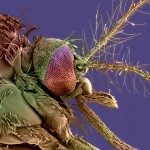Lien vers Pubmed [PMID] – 20345686
Mol. Ecol. 2010 May;19(9):1953-64
The Aedes albopictus mosquito has been involved as the principal vector of recent major outbreaks due to the chikungunya virus (CHIKV). The species is naturally infected by two strains of Wolbachia (wAlbA and wAlbB). Wolbachia infections are thought to have spread by manipulating the reproduction of their hosts; cytoplasmic incompatibility is the mechanism used by Wolbachia to invade natural populations of many insects including Ae. albopictus. Here, we report a study on the effects of removing Wolbachia from Ae. albopictus on CHIKV replication and examine the consequences of CHIKV infection on some life-history traits (survival and reproduction) of Wolbachia-free Ae. albopictus. We found that Wolbachia-free mosquitoes maintained a highly heterogeneous CHIKV replication compared to Wolbachia-infected individuals. In Wolbachia-infected Ae. albopictus, the regular increase of CHIKV followed by a steady viral load from day 4 post-infection onwards was concomitant with a decline in Wolbachia density. This profile was also detected when examining the two key organs for viral transmission, the midgut and the salivary glands. Moreover, Wolbachia-free Ae. albopictus was not altered in life-history traits such as survival, oviposition and hatching characteristics whether infected or not with CHIKV. We found that Wolbachia is not essential for viral replication, its presence could lead to optimize replication from day 4 post-infection onwards, coinciding with a decrease in Wolbachia density. Wolbachia may regulate viral replication in Ae. albopictus, with consequences on survival and reproduction.



